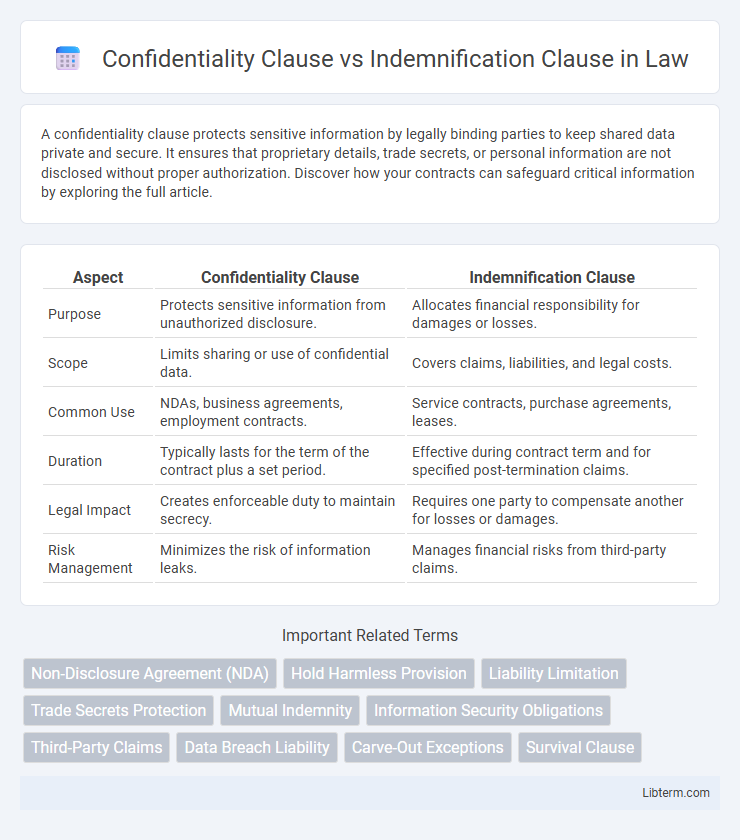A confidentiality clause protects sensitive information by legally binding parties to keep shared data private and secure. It ensures that proprietary details, trade secrets, or personal information are not disclosed without proper authorization. Discover how your contracts can safeguard critical information by exploring the full article.
Table of Comparison
| Aspect | Confidentiality Clause | Indemnification Clause |
|---|---|---|
| Purpose | Protects sensitive information from unauthorized disclosure. | Allocates financial responsibility for damages or losses. |
| Scope | Limits sharing or use of confidential data. | Covers claims, liabilities, and legal costs. |
| Common Use | NDAs, business agreements, employment contracts. | Service contracts, purchase agreements, leases. |
| Duration | Typically lasts for the term of the contract plus a set period. | Effective during contract term and for specified post-termination claims. |
| Legal Impact | Creates enforceable duty to maintain secrecy. | Requires one party to compensate another for losses or damages. |
| Risk Management | Minimizes the risk of information leaks. | Manages financial risks from third-party claims. |
Introduction to Contractual Clauses
Confidentiality clauses in contracts protect sensitive information from unauthorized disclosure, ensuring that parties maintain privacy and safeguard intellectual property. Indemnification clauses allocate risk by requiring one party to compensate the other for specified losses or damages arising from contractual obligations or third-party claims. Both clauses are fundamental in managing legal responsibilities and protecting business interests within contractual agreements.
Definition of Confidentiality Clause
The confidentiality clause is a legal provision that requires parties to keep shared information private and restricts unauthorized disclosure, safeguarding sensitive data such as trade secrets or personal information. This clause is crucial in contracts to ensure that proprietary knowledge remains protected throughout and after the business relationship. Unlike an indemnification clause, which focuses on compensating loss or damage, the confidentiality clause centers on preventing information breaches and maintaining discretion.
Purpose of Confidentiality Clauses
Confidentiality clauses are designed to protect sensitive information from unauthorized disclosure, ensuring that parties involved maintain the secrecy of proprietary data, trade secrets, and personal information. These clauses play a critical role in preserving competitive advantage and preventing reputational damage by legally binding parties to restrict access and usage of confidential materials. In contrast, indemnification clauses focus on allocating risk by requiring one party to compensate the other for losses or damages arising from specific liabilities or breaches.
Definition of Indemnification Clause
The Indemnification Clause is a contractual provision that requires one party to compensate the other for certain damages or losses incurred due to specific actions or breaches. Unlike a Confidentiality Clause, which protects sensitive information from disclosure, the Indemnification Clause focuses on financial responsibility and risk allocation between parties. This clause is essential in managing liability and ensuring accountability in legal agreements.
Purpose of Indemnification Clauses
Indemnification clauses serve to allocate risk by requiring one party to compensate the other for specific losses or damages arising from claims related to the contract. These provisions protect against third-party liabilities, breaches, or negligence, ensuring financial responsibility is clearly assigned. Unlike confidentiality clauses, which safeguard sensitive information, indemnification clauses focus on legal and financial protection within contractual relationships.
Key Differences Between Confidentiality and Indemnification Clauses
Confidentiality clauses protect sensitive information by legally binding parties to keep disclosed data private, whereas indemnification clauses allocate financial responsibility for losses or damages incurred between parties. Confidentiality clauses primarily focus on non-disclosure and safeguarding proprietary or confidential information, while indemnification clauses define the scope and limits of liability and reimbursement for harm or claims arising from contractual relationships. Understanding these key differences helps tailor contracts to address specific risks related to information security and financial liability.
Legal Implications of Breaching Each Clause
Breaching a Confidentiality Clause typically results in legal consequences such as injunctions to prevent further disclosure, monetary damages for losses caused by unauthorized information sharing, and potential harm to business reputation. Violating an Indemnification Clause obligates the breaching party to compensate the other for third-party claims, damages, and legal fees arising from the breach, often leading to substantial financial liability. Both clauses serve to protect parties legally but differ in enforceable outcomes--confidentiality protects sensitive information, while indemnification shifts financial risk and responsibility for damages.
Practical Examples in Business Contracts
A confidentiality clause in business contracts restricts parties from disclosing sensitive information, such as trade secrets or client data, protecting proprietary knowledge during partnerships or negotiations. An indemnification clause requires one party to compensate the other for losses or damages arising from specific liabilities, like third-party lawsuits or breach of contract, ensuring financial protection. For instance, in a software development agreement, a confidentiality clause safeguards source code, while an indemnification clause addresses liability if the software infringes on another company's intellectual property.
Drafting Tips for Confidentiality and Indemnification Clauses
Drafting confidentiality clauses requires precise language to clearly define what information is protected, the duration of confidentiality, and the obligations of the parties involved to prevent unauthorized disclosures. Indemnification clauses must specify the scope of indemnity, including covered losses, triggered events, and any limitations or exclusions to balance risk allocation between parties. Both clauses should use unambiguous terms to minimize disputes, ensure mutual understanding, and align with governing law requirements for enforceability.
Choosing the Right Clause for Your Agreement
Choosing the right clause for your agreement depends on the specific risks and priorities of the parties involved; a confidentiality clause protects sensitive information from unauthorized disclosure, ensuring trade secrets and proprietary data remain secure, while an indemnification clause allocates financial responsibility for potential losses or damages arising from breaches or third-party claims. Evaluate whether safeguarding intellectual property or mitigating liability is more critical to your contractual relationship to determine which clause best aligns with your business objectives. Tailoring the agreement with precise language reflecting the scope, duration, and obligations will optimize legal protection and enforceability.
Confidentiality Clause Infographic

 libterm.com
libterm.com